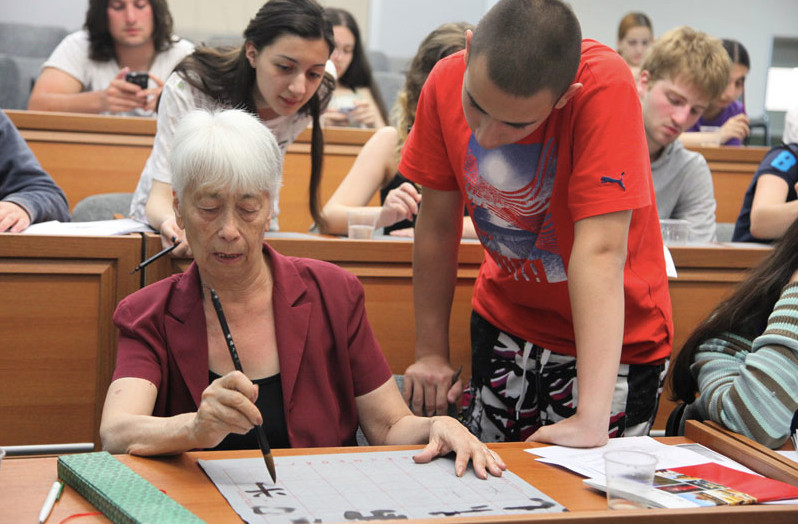Confucius Institutes

Foreign students study calligraphy.
China’s rapid economic development has resulted in the world paying more attention to Chinese language and culture. Since 2004, Confucius Institutes around the world have undergone 10 years of development and made notable achievements. Their bigger role in enlarging communication between China and foreign countries has been fully affirmed by the international community.
Compared to other language and cultural promotion organizations, Confucius Institutes have their own special advantages.
Confucius Institutes are jointly set up by foreign and Chinese universities under the guidance of the Confucius Institute Headquarters. They do not belong to a single country or institution.
They follow the principle of mutual respect, friendly negotiation and mutual benefit. Teachers are mainly from Chinese universities, but local teachers can also be employed if there is a demand.
In addition, the Confucius Institute Headquarters in Beijing has formulated unified by-laws and encouraged institutes to carry out various cultural activities in accordance with local conditions. Some institutes promote traditional Chinese medicine and tea ceremonies to deepen cultural communication.
US scholar Rhonda Zaharna analyzed the structure of Confucius Institutes from the perspective of public cultural diplomacy. According to her research, one of the special characteristics of Confucius Institutes is that they have formed a multi-level cooperative network.
The headquarters is responsible for coordination and holds an annual regional conference to discuss future development plans.
The biggest advantage of Confucius Institutes is their connection to great and profound Chinese culture. Under the aim of promoting multiculturalism and global harmony, Confucius Institutes always adopt an open attitude in showcasing the wisdom of Chinese civilization.
Amid continuous promotion of Chinese language, there is a growing demand for superior faculty. In many cases, realizing efficient communication depends on good communication. Faculty must be able to transcend cross-cultural barriers in teaching Chinese. As units affiliated to foreign universities, Confucius Institutes should strengthen academic construction, perfect faculty and further understand the role of teachers in foreign-language teaching.
In terms of promotion strategy, Confucius Institutes should adhere to the path of cooperation and integration. Further development requires not only following the principle of cultural communication and innovation, but also drawing lessons from foreign cultural achievements and giving full play to foreign resources to truly realize multicultural communication and integration.
Achievements over the past decade show Confucius Institutes are successful vehicles for Chinese culture to “go global.” Foreign-language teaching should focus on its virtue and ultimate goal, rather than just focusing on its function of communication. The aim of learning a language is to not only exchange information, but also to see the world from a different perspective.
Confucius Institutes have been exposed to other countries’cultures in the process of promoting Chinese language and culture, allowing them to absorb their essence. In future, Confucius Institutes should continue to enhance China’s soft power and make contributions to preserving the diversification of civilizations and world peace.
Wang Lihong is Chinese director of George Mason University’s Confucius Institute.
